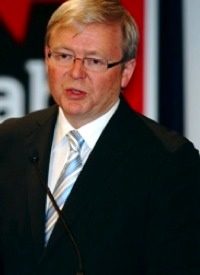
Australian delegates to the UN climate-change conference have arrived empty-handed in Copenhagen since last week their parliament defeated cap-and trade legislation. The surprising turn of events was brought about by a groundswell of angry constituents enraged at the proposed massive tax hike.
Labor Party Prime Minister Kevin Rudd was expecting to brag to Copenhagen delegates about his "Emissions Trading Scheme" (ETS) legislation. The bill would have capped greenhouse gas emissions and instituted an industrial carbon emissions tax of $10 per metric ton beginning in 2011, with even higher taxes in subsequent years. Rudd negotiated a deal in November with Malcolm Turnbull, leader of the Liberal Party (similar to the Republican Party in America), to help get the bill through parliament.
Tim Andrews writes in Investors Business Daily that what followed was "simply stunning. An unprecedented, uncoordinated and spontaneous grass-roots campaign erupted to force the opposition to reverse course." Within one week 14 members of the party’s leadership had resigned in protest and the Liberal Party ousted Turnbull, voting in the more conservative Tony Abbott as his replacement. The new leader not only called ETS a crippling tax on the Australian people but led the senate overthrow of ETS.
Abbott has called anthropogenic (human-caused) global warming (AGW) "absolute crap," but since his election as party leader, he has backpedaled, The Guardian reports. "I think that climate change is real and that man does make a contribution," he said. He affirms bipartisan support for cutting emissions and promises an effective climate-change policy. The Age reports that Abbott said he opposes emission trading systems until they have "become an established part of the world economy," claiming he looks to the United States as leader in the arena of cap-and-trade.
Nevertheless, Abbott leans too far to the right for most environmentalists. Julia Gillard, Rudd’s deputy prime minister, complained that Abbott did not honor Turnbull’s promise to pass ETS, saying, "Australia can’t afford any more delays on climate change," as reported by The Guardian. That publication also quoted Australia’s assistant climate-change minister, Greg Combet, as declaring, "The extremists have gained control of the Liberal party. They are opposed to taking action on climate change. They dispute the science."
Even so, Kevin Rudd, who refers to skeptics of AGW as "climate change deniers" and campaigns on global-warming issues, has nothing to brag about at Copenhagen where he had hoped ETS would set an example and establish his reputation as a world leader on climate change. Undaunted on the home front, however, he refuses to admit defeat. The deal he negotiated with Turnbull promised financial assistance to electricity generators and exemptions for farmers. Since that did not work, he is now promising the public that if ETS is passed when it comes up again for a senate vote in February, he promises financial assistance to low-income individuals and families, with money generated from industrial emissions credits, according to the Australian News.
Rudd refuses to debate Abbott on the issue until Abbott’s party comes up with a viable alternative to the ETS plan. The Guardian warns, "If the Senate rejects legislation twice in three months, Australia’s constitution allows the prime minister to call a snap election before his three-year term has expired." Analysts predict that is likely if the bill fails in February, based on Rudd’s popularity and his dedication to emissions-regulating legislation.
Photo of Prime Minister Kevin Rudd: AP Images



